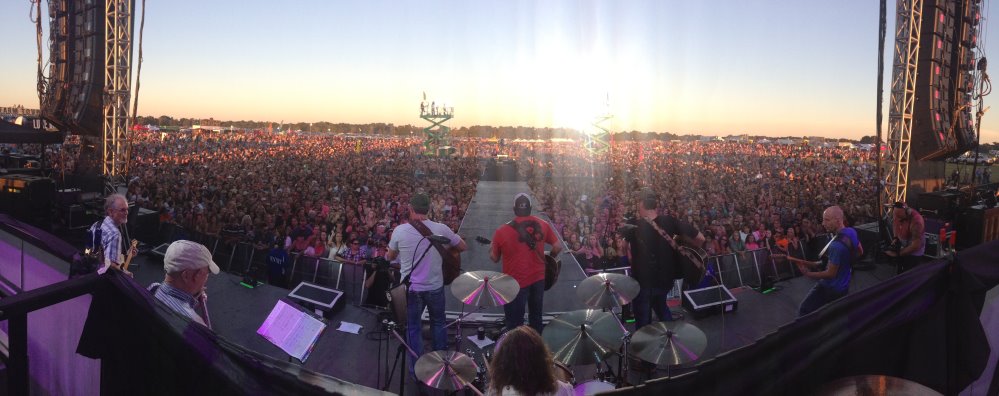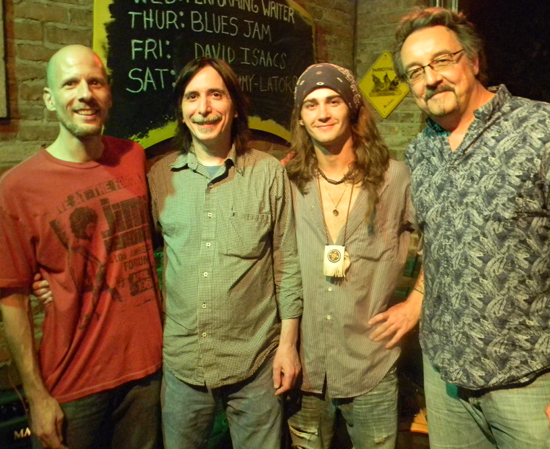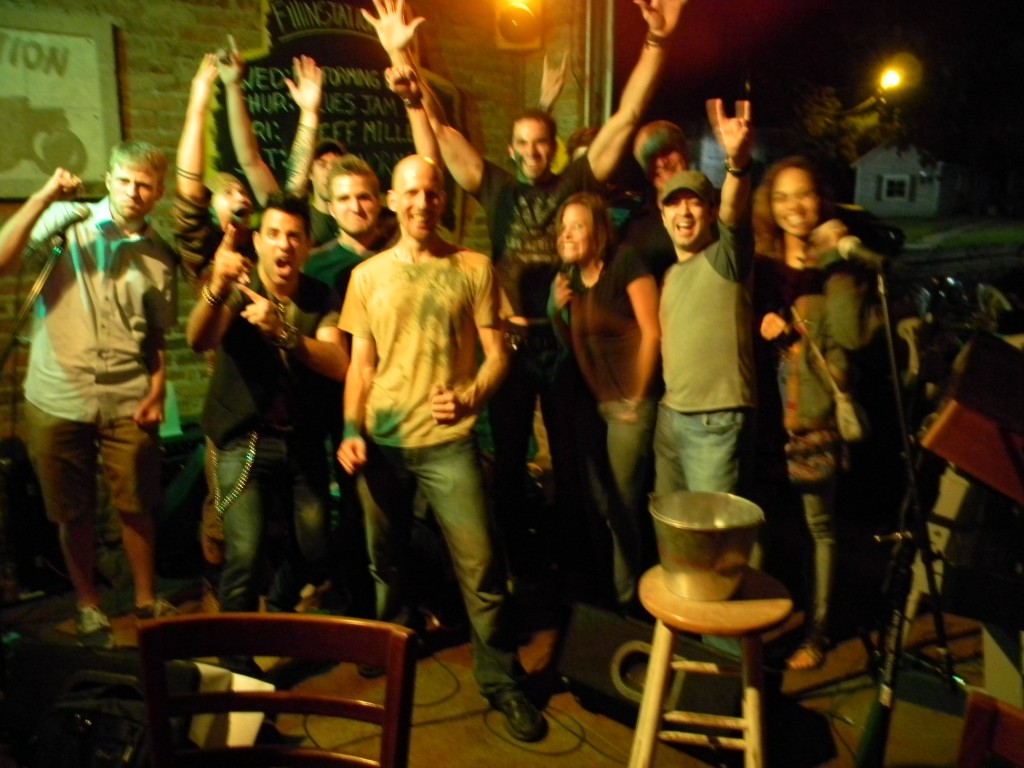music business
Mike Chapman
Back in 2009, I began putting together a list of people to interview for my book, The Nashville Musician’s Survival Guide, and my friend, Mike was at the top of this list. Those of you who knew Mike know that he was a very caring, giving, and humble human being. The interview he gave was not only insightful for aspiring musicians, but also a wonderful insight into his musical journey. Although he has now gone on to a better place, his music can still be heard, and his magical essence still shines through the words on these pages. It is with that spirit that I’d like to share his words with you all. Mike touched so many lives, and we are all the better for it. I miss my friend.
Click here to view the entire interview: https://nashvillemusicianssurvivalmanual.com/Blog/mike-chapman/
The Peach Pickers Rock The 2014 Luke Bryan Farm Tour
By Eric Normand
Sunny days, dusty hayfields, huge crowds, great music, great people, light beer, diesel fumes, gator balls – these were the sights, sounds and aromas of the 2014 Luke Bryan Farm Tour. I can’t believe it’s over, it seems like I just hopped on the bus yesterday. The 8 shows spanning two weeks whirled across the Deep South with the speed of a jet plane and the intensity of a freight train.
My role in this mega-tour as lead guitarist and bandleader for Nashville’s most successful songwriting team of all time, The Peach Pickers, began with our pre-tour warm-up show at a sold out Third and Linsley in downtown Nashville on September 26. The show, which benefited The Wounded Warrior Project was a huge success, and a couple of days after this electric night we hopped aboard a bus bound for Knoxville, TN.
Even though it was October 1, it still felt like summer when I hopped off the bus around 8 AM, the temperature already approaching 80°. This day began for me like every day that would follow on this tour, a trip to catering! After some eggs, home fries and coffee I got ready for my daily trip to the gym with members of Luke’s band and one of the other opening bands, Cole Swindell. While I was doing my thing at the gym, other members of our entourage walked the hayfields, while others took advantage of another luxury provided to the touring musician, sleeping late.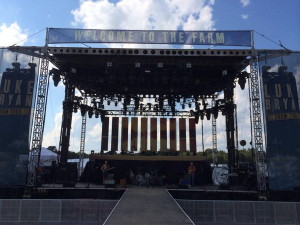
By mid-afternoon it was time for our load-in and sound check. The level of production on this tour was top notch, sporting state-of-the-art lighting, some really cool video walls, and a PA system that would rival that of any mega-rock tour. They even had a remote-controlled flying camera that captured video footage of the audience and performances, otherwise referred to as “the drone”.
Luke’s crew, along with the other crews (which included the world-class sound company, Claire Brothers) not only knew how to make us sound and look great, they were a pleasure to work with. After sound check it was time for a little rest, a quick shower and some dinner before taking the stage at 6:40 PM. Our 40 minute set began just a few minutes after the tour’s first opener, Louisiana native and singer-songwriter, Chancie Neal. The sun was just beginning to set as the DJ introduced our show with something like:
“These three guys are the most successful songwriting team in the history of Nashville. They have 60 number one hits…230 million downloads… please welcome to the stage – Rhett Akins, Ben Hayslip, Dallas Davidson…The Peach Pickers!”
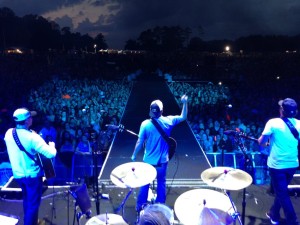 The crowd went wild and we began our onslaught of 13 number one songs with “The Only Way I Know”, a Peach Pickers cut by Jason Aldean. In rapid-fire succession we played down our list, each song greeted with, and followed by the sound of 15,000 people going absolutely berserk! After a few rockers we slowed things down with the heartfelt ballad “I Don’t Dance”. A few of the songs towards the end of our set really seemed to hit home with themes that everybody in this crowd could relate to – “Small Town Throwdown”, “Parking Lot Party”, “All about Tonight”, and the epic hip-shaker, “Boys Round Here”. The set went by like a blur, seeming to end as quickly as it began, and the three stars of our show left the stage to a deafening applause. The crew and stagehands helped us tear down and pack up our gear with lightning speed, and by quarter of eight it was all loaded on the bus and we were done working for the night. Only six more hours until bedtime!
The crowd went wild and we began our onslaught of 13 number one songs with “The Only Way I Know”, a Peach Pickers cut by Jason Aldean. In rapid-fire succession we played down our list, each song greeted with, and followed by the sound of 15,000 people going absolutely berserk! After a few rockers we slowed things down with the heartfelt ballad “I Don’t Dance”. A few of the songs towards the end of our set really seemed to hit home with themes that everybody in this crowd could relate to – “Small Town Throwdown”, “Parking Lot Party”, “All about Tonight”, and the epic hip-shaker, “Boys Round Here”. The set went by like a blur, seeming to end as quickly as it began, and the three stars of our show left the stage to a deafening applause. The crew and stagehands helped us tear down and pack up our gear with lightning speed, and by quarter of eight it was all loaded on the bus and we were done working for the night. Only six more hours until bedtime!
Our show was followed by the fast rising, Cole Swindell, another Georgia native currently enjoying his second number one song, and his four-piece band kept the party going full force. By 9 PM it was time for the Tour-D-Force of this event, Luke and gang to take the stage, his show beginning with the modern day phenomenon of thousands of cell phones being raised into the air to capture an endless barrage of digital photos.
Luke’s show is an exciting ball of kinetic energy, his top notch band providing an AC/DC like “foot stompability” that kept the audience pulsating for his 90 minute set. The phrase “sing along” doesn’t even begin to paint the sonic picture of the sound of 15,000 people singing at the top of their lungs at a Luke Bryan concert. After Luke’s show ended, the crowd quickly dispersed the field, only to be trapped in a massive traffic jam as thousands of cars began their slow motion journeys down the one lane road that led out of this little piece of rural America.
This first day and night of the tour was a huge success, and with each following show, the tour seemed to gain momentum. The only snag of this first week was some torrential rain during Friday afternoon in Tallahassee Florida, and despite what seemed like an impending disaster, the rain subsided right before showtime and the night went off without a hitch. The following night we ended the first leg of 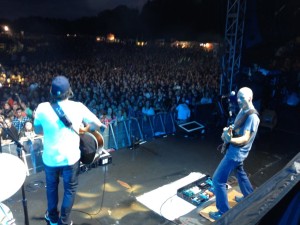 this tour to a crowd of 17,000 in Gainesville Florida, and this was, in my opinion, The Peach Pickers strongest performance yet.
this tour to a crowd of 17,000 in Gainesville Florida, and this was, in my opinion, The Peach Pickers strongest performance yet.
A few days off and we were back at it for round two. The week started out smoothly, but late Thursday afternoon in Columbia, South Carolina it began to sprinkle, with the sounds of thunder and the view of lightning in the distance. Oh no, it was happening again! We pushed back the start of the performances by 20 minutes, and midway through Chancie’s set a downpour began. With a handheld wireless microphone, this brave girl stood out in the pouring rain on the middle of the runway and kept everybody’s spirits high. By the end of her show she was soaked head to toe, as was her acoustic guitar player and percussionist, Austin Marshall (who also just happens to be the Peach Pickers tour manager). The rain stopped as she exited the stage, which was now soaked, and a dozen stagehands began to dry the stage using push brooms, towels, and high-powered electric fans. We began our show with a strange hue lurking behind us in the form of some ominous storm clouds and lightning in the distance.
By the second to last show in Columbia, South Carolina our band was really beginning to hit its stride, and by the final night of the tour, Saturday in Macon Georgia, we were on fire. On the bus shortly before our set, we all talked about our agenda for the night, which basically consisted of kicking some serious ass. And that’s exactly what we did! At one point of the show, me and Dallas even did a couple of moves that might have almost seemed choreographed. The show ended with our usual closer “Boys Round Here” during which Dallas, Rhett, and Ben walked the runway with their wireless microphones, slapping hands with the audience in a climactic sing along.
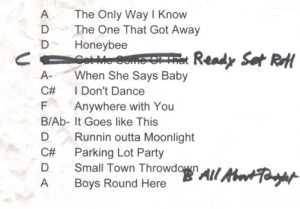 There’s a really unique aspect to a Peach Pickers show. We play songs that are the most successful chart-toppers of modern-day country radio, songs written by these three guys, yet made famous by others. So the crowd knows our tunes, yet most have never heard them performed by the original writers. A Peach Pickers performance is very organic, powerful, sometimes rough around the edges, and performed by what many in Nashville would consider a “stripped down band”. Most of the radio versions of our songs feature multi-tracked guitars, layers of fiddle, steel, keyboards, background vocals, etc, and most touring bands that play behind country artists consist of this instrumentation. Our group is basically like a traditional rock band – drums, bass, and two electric guitars. Nothing against modern day radio production, but I find that this stripped down approach allows us to rock a little harder while allowing the essence of the song to shine through without obstruction.
There’s a really unique aspect to a Peach Pickers show. We play songs that are the most successful chart-toppers of modern-day country radio, songs written by these three guys, yet made famous by others. So the crowd knows our tunes, yet most have never heard them performed by the original writers. A Peach Pickers performance is very organic, powerful, sometimes rough around the edges, and performed by what many in Nashville would consider a “stripped down band”. Most of the radio versions of our songs feature multi-tracked guitars, layers of fiddle, steel, keyboards, background vocals, etc, and most touring bands that play behind country artists consist of this instrumentation. Our group is basically like a traditional rock band – drums, bass, and two electric guitars. Nothing against modern day radio production, but I find that this stripped down approach allows us to rock a little harder while allowing the essence of the song to shine through without obstruction.
While Rhett has had success and experience on the big stage, Ben and Dallas are newer to this forum, yet they rise to the occasion every time, perhaps with an excitement and enthusiasm that would be impossible to have in any other scenario. Together, the three of them make a formidable team. It probably doesn’t hurt that the rest of our band is made up of some extremely talented folks – Nick Forchione on drums and former G-men, Mike Chapman on bass and Chris Leuzinger on electric guitar. I’m extremely proud of this band, were all friends, we love playing music together, and we make it happen every time.
The farm tour might be over, but the memories are forever. Luke’s entire crew, band, and management treated us with great care and respect, which speaks volumes of the man himself. We all made some new friends and strengthened the bonds between old ones, and I sure hope we get to do it again next year! In the meantime, The Peach Pickers might just have a few more surprises for you, stay tuned!
Click to view a slideshow of many more images from the shows.
Music and Art; to Pursue, or Not to Pursue?
By Eric Normand
I recently read an article on Huffington Post, “Art and Music Are Professions Worth Fighting for, and while I agree with some points of this article I think the author does a major disservice in presenting the pursuit of music as a profession in a kind of “all or nothing” approach. He talks about a presentation he made at a high school career day where he suggests music as a possible career choice for young people. He says that those interested should “go for it, with abandon and furious joy, and that you do so without a plan B”. This is where I disagree. I also disagree with the distinction this makes between “career musicians” and nonprofessional musicians. Just because you don’t play professionally doesn’t mean your music isn’t valid. I agree, if you love music and want to pursue it, why not pursue it wholeheartedly, but what’s the matter with pursuing music while earning a living from something else? What’s the matter with pursuing music for the mere enjoyment of it? I believe you can pursue music as a career and for fun, but you need to keep your eyes open and realize that you will need a steady income stream along the way. To decide how music or a music career might fit into your life, perhaps the questions you really need to ask yourself are; why are you pursuing music, what do you want to get out of it, and what will it take to be successful? What is your definition of success?
When I was a senior in high school, if you had asked me what I wanted to be when I grew up I would have said, “a professional musician”. Immediately after high school I got a job as an apprentice drywall carpenter before enrolling in the Berklee College of Music two years later. After Berklee I played professionally in nightclub bands for the next 14 years, eventually also becoming a guitar teacher. In 2002 I relocated to Nashville Tennessee where I’ve had the good fortune to work as a hired gun on several major tours. My first gig was as a guitar tech for Toby Keith, and I went on to play lead guitar with several country artists – Daryle Singletary, Vern Gosdin, Rhett Akins, and the hit songwriting team known as “The Peach Pickers”, among others. I also wrote a book about how to navigate the Nashville music industry, “The Nashville Musician’s Survival Guide”.
Looking back, if you had told that starry-eyed high school kid that one day he would be a musician, painter, drywall carpenter, teacher, author, and website designer, he would’ve said “Naw, I’m not interested in any of that other stuff”. But as they say “life is what happens while you’re busy making other plans”, and one of the things I’ve learned along the way is that you have to wear a lot of hats to survive in this world. The truth is, my original goal of being a professional musician was based on the glamorization of the musical era that I fell in love with, and I had no idea about the reality of any of it.
What do professional musicians do?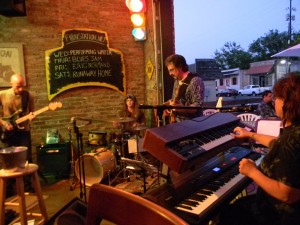
We starve! Just kidding (well, not entirely). The options for musicians trying to earn a living from their craft are somewhat limited. The way I see it you can pursue one or more of the following avenues; nightclub musician, music teacher, touring musician, or session musician. Sure, there are other gigs (orchestra musicians, jingle writing, etc.) but these four are the most practical, and out of these, the first two are the only ones that ever become reality for most. If you want to be a touring or session musician, you will need to live in a music metropolis such as Nashville, New York, or LA, and these are extremely hard (but not impossible) gigs to land.
Regarding paying gigs, I’m talking about work you can get on a regular basis that pays real money for your services. Therefore, I’m leaving out songwriters and aspiring artists because these do not pay any real money unless you become extremely successful. TV shows like “American Idol” and “The Voice” have propelled the myth that anybody that learns how to sing a good cover song can become a national recording artist and superstar. Out of the tens of thousands who audition for these shows and the hundreds that perform on them annually, how many are ever heard from again?
While I cherish many of my experiences as a professional musician, I’ve learned the hard way that it doesn’t always pay the bills. Night club gigs still pay what they paid 25 years ago when I first got into this ($100 a night is still considered good pay) and most club gigs in Nashville don’t even pay that. As far as touring musicians, most tours only pay during the part of the year that the tour is active and, unless you are on a very high profile tour, you’ll have to find another income stream during the winter.
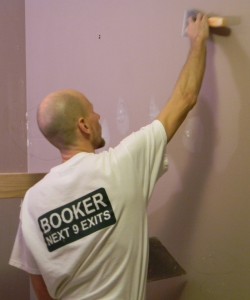 Two years ago, I went back to full-time construction work, and put my music career on part-time status. I began approaching music as simply one component of my life, and for first time since I’ve been in Nashville I’m actually earning a steady living year-round. I still play music, sometimes for pay, always for fun, and I get just as much reward, if not more, out of a local club gig playing for tips as I do when I perform with The Peach Pickers on the Luke Bryan farm tour in front of 15,000 people.
Two years ago, I went back to full-time construction work, and put my music career on part-time status. I began approaching music as simply one component of my life, and for first time since I’ve been in Nashville I’m actually earning a steady living year-round. I still play music, sometimes for pay, always for fun, and I get just as much reward, if not more, out of a local club gig playing for tips as I do when I perform with The Peach Pickers on the Luke Bryan farm tour in front of 15,000 people.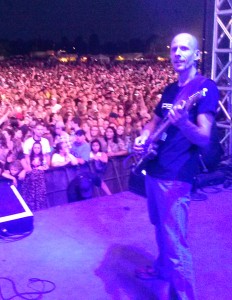
Don’t get me wrong, I’m not here to talk people out of their dreams; after all, I did write a book about surviving the Nashville music industry. But if this is your dream, you need to arm yourself with knowledge and know what you’re up against. If you’re thinking about pursuing music or arts as a profession you must first “define your success”. What is your definition of success in music? Then ask yourself why you want to do this. If it’s because you think it’s an easy and fun way to make a living you might want to do a little more research. It can be fun, but it’s definitely not easy. If it’s because you absolutely can’t see yourself doing anything else, then go for it, but have a plan B, and have a way of earning a living while you pursue it.
There’s nothing wrong with pursuing music as a career, and there’s also nothing wrong with being a musician or artist that never becomes “professional”. Music is one of the oldest forms of communication, music has the power to heal and unite people, and playing music makes you smarter. So go ahead and work at becoming a great musician, it’s a noble thing to do and the world always needs good music and art. Approach your music with abandon and joy, but don’t be afraid to have a plan B.
Follow Eric on Twitter and his blog at survivenashville.com
The Peach Pickers on the 2013 Luke Bryan Farm Tour
by Eric Normand
This year’s Luke Bryan Farm Tour was an epic event and as a “Peach Pickers” band member I was a first-hand witness to what has become a yearly phenomenon in the Deep South. We played eight sold out shows in eleven days, most of them taking place on actual farms, and the fans showed over-the-top enthusiasm for Luke, The 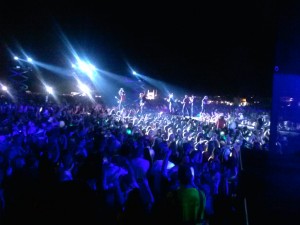 Peach Pickers, and the other acts on the bill, Cole Swindell and Chancie Neal.
Peach Pickers, and the other acts on the bill, Cole Swindell and Chancie Neal.
For those of you not in the know, the Peach Pickers are the most successful songwriting team in the history of Nashville and are comprised of Rhett Akins, Dallas Davidson, and Ben Hayslip who together have penned 40 number one hits and countless top 20’s. Lifelong friends of Mr. Bryan, they’ve written and co written several of his biggest songs and at the time of these concerts had five out of the top 10 songs on country radio. Full of nothing but chart topping hits, our 12 song, 45 minute set was extremely well received and while these Georgia natives don’t perform live on a regular basis, there is an undeniable honesty and vibe to their performances when they do.
The Peach Pickers band consists of Nick Forchione on drums (on loan from the Black Crowes crew), “G-men” members, Mike Chapman on bass and Chris Leuzinger on guitar (the G-men are a group of session musicians who played on all the Garth Brooks records), and myself on guitar and bandleader duties.
The production on this tour was truly impressive and it was amazing to watch the daily transformation of an empty field into a state of the art concert production in just a few hours. In addition to the audio, lighting, and video crews, the Luke Bryan Farm Tour travels with its own catering company, stagehands, security personnel, and mobile stage – they even erected a fence that encircled the concert grounds on a daily basis. Setups began in the early morning, the complete production was up by early afternoon, and all the bands were sound checked before the crowd funneled in at 5 PM. The first act was on at 6:30, Luke’s show ended around 11, and by 2 AM we were rolling down the road to the next farm (at least most of us were).
The evening’s first opener, Nashville based singer-songwriter; Chancie Neal played an intimate, acoustic set to begin warming up the capacity crowds of 8,000 to 17,000. Following Chancey was Cole Swindell who rocked the attentive crowds with his high-energy four-piece band on a nightly basis. By the time Cole finished his set the sun was just going down, and after a brief changeover we began our show to a crowd that was primed and ready.
Our set list was a literal Who’s Who of modern country radio featuring several number one songs written by The Peach Pickers and brought to the masses by artists like Billy Currington, Blake Shelton, and other country music giants. Our show went like this:
- All about Tonight
- The One That Got Away
- Hey Girl
- Anywhere with You
- That’s How Country Boys Roll
- It Goes like This
- Farmers Daughter
- Running Outa Moonlight
- Point at You
- Honeybee
- Parking Lot Party
- Boys Round Here
A set list of such well played radio tunes makes for quite the sing along and at times the sounds of thousands of voices singing along rivaled the volume of the band. Our show-ender, “Boys Round Here” made for a pinnacle moment during which Ben, Rhett, and Dallas walked “the runway” – high-fiving audience members while taking turns singing verses. Our shows ended with a roar of applause and minutes later our gear was packed up and under the bus. Shortly after the conclusion of our set, Luke and band brought the night home – their high energy, action-packed set as well received as any touring entity out there. Their show even featured an acoustic set, during which the entire band converged on an intimate setting created in the middle of the runway.
For me, this two week stint was one of my musical high water marks of the year and only bestowed a few minor inconveniences (bad cell phone coverage, short nights of sleep, and maybe a little extra dose of pollin and ragweed). I got to reconnect with some old friends and made some new ones – I even participated in a daily run to a local gym with some of the guys from Luke’s and Cole’s bands.
One thing I can say about the Luke Bryan Farm Tour is that it has a family-like vibe. The artists, musicians, and crew members all worked together with the common purpose of making a great show happen every night, and a great show did happen every night! On the last night of the tour, I found myself in a moment of irony watching one of Luke’s final songs of the evening from side stage, “I Don’t Want This Night to End”. I think there was some real truth in that moment for many of us.
If you want to learn more about what happens behind the scenes in the Nashville music industry, check out Eric’s book “The Nashville Musician’s Survival Guide”.
Peach Pickers’ Rhett Akins and Dallas Davidson take some “Back Roads” on the Luke Bryan Farm Tour 2012
By Eric Normand
What an amazing run of shows we had with Rhett Akins and Dallas Davidson on the forth installment of the Luke Bryan Farm Tour! The sold out tour embarked on eight shows across the Deep South, with Rhett and Dallas performing acoustically on the first four, and me and the boys joining in for full band performances on the second leg. The weather for these events was picture perfect, the crowds were huge, and the shows an amazing encapsulation of kinetic energy!
Me and the rest of the band (Nick Forchione on drums and Tom Good on bass) converged at a bus yard in Nashville on Tuesday night and hopped on Luke’s band bus. You never know what to expect in these situations, (as the two bands began this run as total strangers) and we were pleased to learn that Luke’s band and crew are some of the nicest people you could ever hope to work with. Gracious hosts, they made us feel instantly at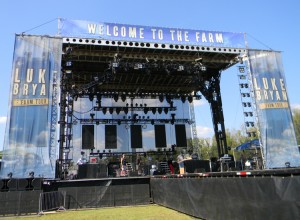 home.
home.
After a good night of sleep on a smooth riding Prevost I awoke in Villa Rica, Georgia. This first show was on a football field, and by the time I wandered over to catering around 10 AM the mobile stage was already up, the field buzzing with activity. Luke went all out on the production for this tour, and there were no less than eight buses accompanying the five semi’s full of staging, audio, lighting, video, and pyro it took to put on these mega-shows.
I was thrilled to find out that there were some other health-conscious folks in Luke’s entourage, and me and Nick joined several of Luke’s band-mates on a trip to the fitness facilities at the University of West Georgia. By 4 PM the stage crew was ready for our sound check, quickly dialing in our in-ear monitor mixes and a bigger than life sound through the mains of the million-dollar Claire Brothers sound system. As a guitar player, I’ve always struggled with in-ear mixes, lack of warmth and ambience being my main gripes, but on this lucky day I learned a new trick. Upon the suggestion of the Claire Brothers monitor engineer, we put a little reverb on my guitar in my ear mix, and this created some extra depth.
Later that night and after the first two openers, Chancie Neal, and Cole Swindell, we took the stage for the first full-band show with Rhett and Dallas. As members of the red-hot songwriting team known as “The Peach Pickers”, Rhett and Dallas have 13 number one songs and countless top 20 hits between them, including a few of Luke’s recent hits “Rain Is a Good Thing”, “Country Girl Shake It for Me”, and “I Don’t Want This Night to  End”. This fact makes it pretty easy to create a blockbuster 45 minute set which included Blake Shelton’s “All about Tonight“ and “Honeybee”, Rodney Atkins’ “Farmer’s Daughter” and “Take a Back Road”, and the Trace Adkins chart topper “Honky Tonk Badonkadonk”, among others. At times the crowd was singing along at a volume that was as loud, if not louder than the band! The action-packed set went by at warp speed, and it seemed like no sooner than we had started we were walking off the stage.
End”. This fact makes it pretty easy to create a blockbuster 45 minute set which included Blake Shelton’s “All about Tonight“ and “Honeybee”, Rodney Atkins’ “Farmer’s Daughter” and “Take a Back Road”, and the Trace Adkins chart topper “Honky Tonk Badonkadonk”, among others. At times the crowd was singing along at a volume that was as loud, if not louder than the band! The action-packed set went by at warp speed, and it seemed like no sooner than we had started we were walking off the stage.
The stagehands helped us get our gear off the stage and by 9 PM our workday was done. A short workday is characteristic for an opening act on a major tour – you’re the last to sound check and the first to play. Now it was Miller time, or in this case “Coors time”, or for a few of us “Crown Royal time”! After a quick cocktail and a little chill time on the bus we went out to check out Luke’s show. The level of musicianship in Luke’s band is nothing short of exceptional, and their 90 minute set was a rocking good time with some stunning visual aspects as this night was a dress rehearsal for the following show which was being taped for a television special.
The following day I awoke and looked out the bus window to the view of an open, grassy field in Athens Georgia – this concert was actually taking place on a real farm! After a little morning chow I decided to take a jog down some of the surrounding roads of this picturesque farming community, Rhett’s song, “Take a Back Road” having some real relevance on this warm autumn day. The day evolved similarly to the previous and the ultra-professional crew did an outstanding job erecting this mega-production in less than ideal circumstances. I later learned that the 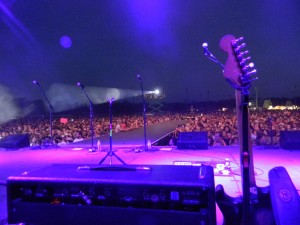 stagehands on this particular tour traveled from show to show (unlike many touring situations where stagehands are local to each venue) and this creates a continuity that helps the production run smoothly. The performances on this night went off without a hitch, with all of the bands delivering outstanding performances. Luke’s show was filled with special visual effects for the filming of the television production – including a laser show, pyro, and a massive finale of fireworks to end the night.
stagehands on this particular tour traveled from show to show (unlike many touring situations where stagehands are local to each venue) and this creates a continuity that helps the production run smoothly. The performances on this night went off without a hitch, with all of the bands delivering outstanding performances. Luke’s show was filled with special visual effects for the filming of the television production – including a laser show, pyro, and a massive finale of fireworks to end the night.
The next day would find us in Tallahassee, Florida and I joined up with some of the guys to go work out at the fitness facilities of Florida State University. After a great workout at a great facility we were ready to get back for some lunch, but not before winding up in a “runner altercation”. The runner informed us that he needed to stop at Lowe’s to get some stage pins for the production crew. Of course they didn’t have what he was looking for and sent us to another store that didn’t have it either. An hour and a half later we caught a lucky break at a John Deere tractor store and were finally heading back to the venue with the necessary part, and some growling stomachs. Another sold out show, another night of great performances and we were off to the tour’s grand finale in Macon, Georgia.
As Luke’s buses were returning to Nashville after this final show and we were going on to play one more show with Dallas and Rhett at the Georgia Throwdown in Dallas’ hometown of Albany, Georgia (a festival that Dallas helped organize), we had another bus arriving in Macon late morning. After the bus arrived we loaded our stuff onto it and continued about our day. As Macon is home of the final resting place of Duane Allman and Berry Oakley, a couple of us took the mile and a half walk to the Rose Hill Cemetery, a place from another world where a young Allman Brothers Band once played guitars, wrote songs, and partied into the hot Georgia nights.
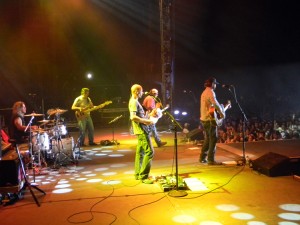 Later on we took the stage in front of 16,000 fans for a final, climactic performance on this epic tour. I’ve played countless big shows over my decade in Nashville, but on this particular night a special energy was present. The songs just seemed to play themselves and the crowd was singing every chorus (and many verses) at a near deafening volume. At one point I pulled out one of my in-ear monitors to really internalize the feeling of the moment. As a musician it’s almost otherworldly to hear and feel your guitar coming out of 100,000 watts or so of PA speakers, and to feel the interaction between artists, band and audience on a show at this level is truly amazing! Our band was really on and Rhett and Dallas were at the top of their game, putting on a dazzling show for what looked like a sea of humanity that stretched to the horizon.
Later on we took the stage in front of 16,000 fans for a final, climactic performance on this epic tour. I’ve played countless big shows over my decade in Nashville, but on this particular night a special energy was present. The songs just seemed to play themselves and the crowd was singing every chorus (and many verses) at a near deafening volume. At one point I pulled out one of my in-ear monitors to really internalize the feeling of the moment. As a musician it’s almost otherworldly to hear and feel your guitar coming out of 100,000 watts or so of PA speakers, and to feel the interaction between artists, band and audience on a show at this level is truly amazing! Our band was really on and Rhett and Dallas were at the top of their game, putting on a dazzling show for what looked like a sea of humanity that stretched to the horizon.
A little while later Luke and his boys played their final show of the Farm Tour, and their epic performances received over-the-top responses after each song. When the show ended all of the artists, musicians, and crew members gathered on the stage for a group photo of the entire entourage. I was sad to see this run end, but we left for Albany with the knowledge that we made a lot of people happy over the course of this week, and we had also made some great new friends! See you next year, Farm Tour!
To view a slideshow of some pics from the tour click here.
Jack Pearson at the Nashville Berklee Jam – August 14, 2011
Guitarist, singer, songwriter, producer and session-musician, Jack Pearson shared some unique perspective about his musical journey with a room full of Berklee alumni and others from the Nashville music community last Tuesday. The Nashville Berklee Jam, held monthly at the Fillin’ Station in Kingston Springs, saw some new faces and old friends on this special night, and Jack’s decades of experience as a world-class musician provided a rare peek behind the curtain for all those in attendance.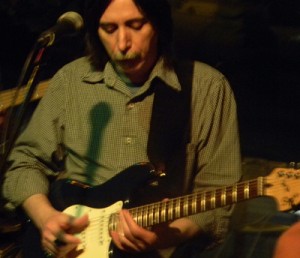
Jack’s musical career began in the mid 1970’s, when he played in multiple bands and logged his first recording session at age 16. In 1993 the Nashville native began his relationship with The Allman Brothers Band as a sub for Dickey Betts, eventually becoming a member of the ABB from 1997-1999 and also touring with Gregg Allman & Friends. Over the years he’s also worked with Vince Gill, Delbert McClinton, Jimmy Buffett, Earl Scruggs, Bobby “Blue” Bland, Amy Grant, Faith Hill, Gov’t Mule, Buddy DeFranco, and countless others.
Jack began his part of this night by playing some beautiful sketches of “I Can’t Get Started”, and for those who have never heard him play, his ability to transport an audience through time and space with nothing other than an unaccompanied electric guitar became quickly apparent. Following the spontaneous applause, Jack cut straight to some Q & A. One of the first questions asked was about his guitar, and I found it interesting that the deep, rich tone coming out of our backline Fender Deluxe originated from a Fender “Squire” Stratocaster, which he had recently bought for $100 at a pawn shop. Plugged into nothing other than a lone tube screamer, this drove home the point that great tone comes from within.
Learning from his oldest brother, Jack was exposed to rockabilly and blues as a teenager and explored the music of Chuck Berry, The Ventures, and Carl Perkins at a young age before eventually discovering jazz greats like, Wes Montgomery, Django Reinhardt, and Charlie Christian. Learning from friends, other musicians, and records, he slowly pieced together his musical vocabulary. He shared some thoughts on how to approach a II-V turnaround, demonstrating some different voicings and melodic approaches, underscoring the importance of putting song and melody above the technical understanding of modes and scales.
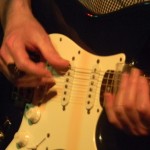 “It takes a lot of experimenting… a lot of guys come to me that get out of school and they say, “when I hear this chord I’m supposed to play this mode and scale”, and it locks them up. They can’t make any melodies because they’re told to play a mode or a scale.”
“It takes a lot of experimenting… a lot of guys come to me that get out of school and they say, “when I hear this chord I’m supposed to play this mode and scale”, and it locks them up. They can’t make any melodies because they’re told to play a mode or a scale.”
This simple, but prophetic thought resonated, and I had flashes to a time in my life when I over analyzed the music I played. Jack drove this point home with “…it comes down to the chord and the melody and where it’s going to…”
He went on to talk about the blending of styles and how he went through different periods of his life where he would be deeply immersed in a singular style for a few years – Delta blues, jazz, etc., and that after a while, all these different styles started coming together. Not afraid to take some chances musically, he demonstrated how he might go from a Howlin’ Wolf lick to a Charlie Parker lick within the same phrase, and that while some players will say this is wrong, he believes that “the main thing is to get the music out, and play with feeling.”
In response to a question about some of his best and worst gigs, Jack said that some of the worst gigs are when people don’t listen, and the music that you play with somebody is more important than the venue, or how famous somebody is.
He explained how learning all of the Allman Brothers songs as a kid helped put him in the position to sub for Dickey Betts on an early 90s Allman Brothers tour, which led to some recording with Gregg Allman and eventually to a phone call from Greg in which he was asked if he wanted to join the Allman Brothers band.
He candidly shared how this landmark gig damaged his hearing, causing an already existing case of Tinnitus to worsen, ultimately forcing him to leave the gig, perhaps sooner than he otherwise would have.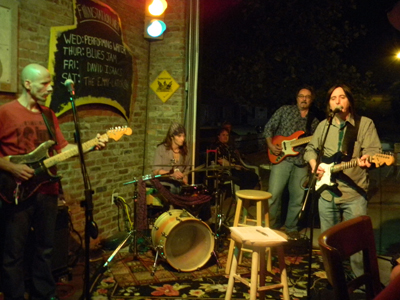
“There’s really no way to describe how loud it was on stage…Dickey Betts wasn’t in the PA…he was 135 dB side stage…”
As a fellow tinnitus sufferer I completely related to this portion of his talk and gained some new perspective as he explained that, despite wearing earplugs, extreme SPL’s (sound pressure levels) can still do damage, as the sound can affect your inner ear by entering your nose, mouth, and through your bones.
In response to a question about life lessons learned through music he answered, “Try not to take music for granted, it’s so special, and you can reach so many people…lyrics can encourage you, relate to your pain, but you can also do it with notes.” He demonstrated this by showing how the same group of notes can sound happy, or sad depending on where the emphasis is placed. He talked about the endless possibilities of how you can play even a single note, demonstrating this concept by playing a huge range of variances on a high “G” note.
After Jack’s talk concluded he played a short set with our Alumni House Band, the air becoming filled with the sounds of spontaneous applause after each inspired performance. Jack left shortly after his set, and the other alums in attendance continued jamming into the night. I, and everyone else in attendance would like to extend our appreciation and gratitude to Jack for sharing his music and journey on this special night!
Our next Nashville Berklee Jam will feature country music artist and hit-songwriter, Rhett Akins on Tuesday, September 11 at The Fillin’ Station. For more info, go to www.nashvilleberkleejam.com.
The Nashville Berklee Jam Goes Public
Today I want to tell you all about an exciting monthly event I have been hosting – The Nashville Berklee Jam, and its new accessibility to everyone in the Nashville music community. The beginnings of this idea came to me a few years ago when I first attended the annual Nashville Berklee Alumni Reception. On my way home that night, I remember thinking how great it was to meet so many musicians in one night who were so passionate about their musical ambitions and so hungry for knowledge. These musical comrades were a mix of Berklee alumni residing in middle Tennessee and Berklee students who came down for the annual Nashville field trip. At this reception I made connections with other like-minded alums and students who came down on the field trip, the latter peppering me with questions about my experiences in Music City. This event was a very stimulating night as the energy of three hundred musical minds meeting and conversing seemed to create an air of camaraderie and untapped potential! Then I went home and another year passed before I got this fix again.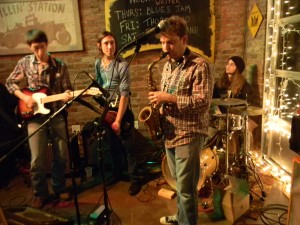
So this past winter I decided to create a monthly event to try to emulate this musical networking hoedown on a smaller scale, and The Nashville Berklee Jam was born. Held on the first or second Tuesday of the month from 7 PM to 11 PM at The Fillin’ Station in Kingston Springs, TN, these events start out with an informal meet and greet, followed by a Nashville music industry guest speaker, and end with an open jam. So far the reception has been very positive, here’s a recap (with links to their corresponding blogs):
February – A-list session bassist, Mike Chapman gave a great talk about being a session musician, outlining key concepts in what he calls, “the essential slices of the session player pizza”. He also jammed with several alums after the talk.
March – award-winning vocal coach, producer, and hit songwriter, Judy Rodman gave an insightful talk about career paths for vocalists. She also performed a couple of songs with the house band and then critiqued and coached several vocal performances, helping vocalists make instant improvements.
April – Stevie Ray Vaughan keyboardist, Reese Wynans shared his fascinating story about being a lifelong-career musician, the life-changing moment that came on his last night with Delbert McClinton that landed him the SRV gig, and the whirlwind years that followed. After his talk, he joined us for a few inspired performances.
May – fellow alum, musician, and author of “The Nashville Number System”, Chas Williams gave an introductory class on this subject. After the class, he charted one of alum, Sarah Tollerson’s originals and performed it with Sarah and the house band with everybody reading the chart off a dry erase board.
June – drummer, producer, and clinician, Rich Redmond gave an inspiring talk on “Navigating the Nashville Music Industry” speaking candidly about his early “lean years” in Music City and different approaches to finding success here. After his talk he sat in for a few tunes and stuck around to chat with others in attendance.
For our next event, to be held on Tuesday, July 10, I will be giving a talk that continues last month’s theme – “Navigating the Nashville Music Industry – Part Two”, during which I will explore some of the concepts I write about in my book “The Nashville Musician’s Survival Guide”. And, this just in, for our event in August we are proud to announce that the guest speaker/performer will be none other than Nashville guitar ace, Jack Pearson, formerly of the Allman Brothers, Vince Gill and many others.
All of the guest speakers have given great talks, sharing their knowledge and providing inspiration, and these talks have been interactive with many great questions and comments from alums. My band, Skinny Buddha (comprised of Berklee alumni and others from the Nashville music community) provides backline and a starting point for the laid back jams which have covered everything from originals to classic rock to blues tunes to two-chord jams. All of these events have been great friendship building and networking experiences for all involved, as well as educational. So far, the attendance has been mostly comprised of Berklee alumni, but as there seems to be a growing interest from others in Nashville, we are now officially making this event open to the Public. Nashville is a diverse and complex music community in which a Berklee alumni community also resides, and it is my goal to help these two worlds intersect and meld together.
So come on out to our next “Nashville Berklee Jam” On Tuesday, July 10. I hope to see you there!
P.S. if you have any comments, thoughts, or questions, please feel free to e-mail me at eric@ericnormand.com.
Peach Pickers featuring Rhett Akins and Dallas Davidson rock CMA-Fest 2012
Even though the majority of the people who come to Nashville for CMA week are country music fans, you didn’t have to be one to enjoy the BMI songwriter showcase-tailgate party yesterday at LP Field. This unique event was as much a foot stompin’ rock concert as it was country music show, and the crowd of 3000 plus concertgoers received a rare treat on this warm, sunny afternoon. 2011 EMI songwriter of the year, Rhett Akins, and 2011 BMI songwriter of the year, Dallas Davidson, also known as the Peach Pickers, have written some of the biggest chart-toppers in recent country music history, and collectively have more hits songs currently on the radio than any of the major artists they write for.
As professional songwriters, they sit in a room with their acoustic guitars daily, writing hundreds of songs a year to come up with a handful of radio-bound gems. These songwriting sessions, and the demo recording process that follows, are quite often the first and last times they get to perform this music. So this rare occasion to play the hits they wrote in front of a large audience was as much, if not even more of a treat to the Peach Pickers as it was to anybody in attendance.
The hour-long show was off and running with the number one hit cut by Blake Shelton, “All About Tonight”, a fitting start for this musical adventure. Rhett and Dallas took turns singing verses and choruses as we moved through what was essentially a “greatest hits” of modern country radio music, including the six number ones they’ve written in recent years. The crowd sang along throughout the show as we put our own twist on songs like Honeybee, Take a Back Road, Gimme That Girl, Put a Girl in It, Honky-Tonk Badonkadonk, This Ole’ Boy, and several others.
Near the end of the show, Rhett unexpectedly pulled out a couple of surprises, performing his own hits “That Ain’t My Truck”, and the showstopper, “Kiss My Country Ass”. At a few different points throughout the show, Rhett gave credit to the band which was comprised of Nick Forchione on drums, Mike Chapman on bass, Scott Tweten on guitar, and me on guitar and harmony vocals, the excited crowd responding with cheers of approval every time. We concluded this blockbuster set with the fitting “I Don’t Want This Night to End” a number one song which was cut by Luke Bryan and had just won video of the year the night before.
The truth is that none of us wanted this night to end, it was a special moment and the unique nature of this show will make it one of the more memorable things I have been a part of in my 10+ years working in the Nashville music industry. But the good news is that we will be taking this show on the road a little later on in the summer, performing at Michael Waddell’s annual Bone Collector fan club party on August 17 in Montgomery, Alabama. I want to send out a special thank you to all the fans that came out for this show, and everybody who put in a lot of hard work behind the scenes to make this event the huge success it was. Till next time, “it’s all about tonight”!
Click here to view some photos from the show (courtesy Kelly Normand)
For more in-depth perspective on the behind the scenes of the Nashville music industry, please check out my book “The Nashville Musician’s Survival Guide”, which features an in-depth interview with Rhett as well as many others Nashville insiders.
Nashville Berklee Jam with Rich Redmond – June 5, 2012
The latest Nashville Berklee Jam last Tuesday was a great success, thanks to all who attended! The weather was beautiful, so we had a very laid back talk outside on the patio at The Fillin’ Station, our usual location for this event. Rich Redmond, the guest speaker on this night, has worn a lot of hats during his 15 years in Nashville – session/touring drummer, producer, clinician, public speaker, and his hour-long talk gave all in attendance some great perspective into different ways to navigate the Nashville music industry.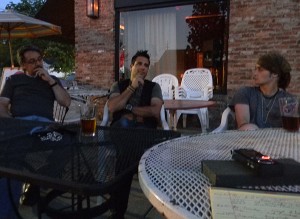
Rich spoke of the need to aggressively market yourself to find work in Nashville and how in his earliest days he obtained work by handing out demo cds of his drumming abilities to almost everyone he would meet around town. He candidly talked about those ‘lean years’, and that long before he was recording on hit records, touring the world with Jason Aldean, and producing acts like ‘Thompson Square’, he was hustling gigs on Broadway, playing in corporate party bands – whatever was necessary to insure survival.
For those who are just starting out in Nashville, he recommended that musicians “take every gig that’s offered”, as every new gig can potentially lead to new relationships and different career opportunities and that “If you give more to people then they expect, if you consistently exceed expectations, people are going to want to work with you.”
He spoke of the need to be ultra-professional by “always returning phone calls in a timely manner, always returning e-mails in a timely manner, being professional, being flexible, having the right gear to do the job and never mailing in a performance…”
Regarding the importance of reputation he said “You can have a great website, you can Tweet 1000 times a day, you can have a fantastic business card that’s got the really good paper, you know the really firm stuff that you have to pay extra for, and it’s still going to come down to word-of-mouth. In this [digital] age it’s so easy to be talked about in a positive or negative way, globally.”
During one part of the talk he mentioned a concept he refers to as “CRASH” a phrase he coined that stands for Commitment, Relationships, Attitude, Skill and Hunger – the five key ingredients he believes are necessary to succeed. He also spoke of the importance of defining your own success, a concept I talk about in my book “The Nashville Musician’s Survival Guide” (coincidentally, Rich contributed to the writing of this book).
After fielding several questions, he finished his talk and we all headed inside to make some music. Everyone who wanted to jam got a chance to sit in, and several great performances took place – ranging from classic rock covers to blues jams to originals. Rich stayed till the end making himself accessible to anyone who wanted to hang and chat, and during the middle of the jam he got behind the drum kit and played a few songs with me and several other alums. Here’s an MP3 of us playing a spirited version of the Jimi Hendrix classic, ‘Little Wing’ Little Wing Berklee Jam w Rich Redmond low. The night ended and we all headed home, but not until gathering for a group photo.
I want to thank everybody who came out and participated to make this another great event, see you at the next one! The next Nashville Berklee Jam will be held on Tuesday, July 10 – check back in a few days for info on the guest speaker for that night.
Stevie Ray Vaughan keyboardist, Reese Wynans talks at Nashville Berklee Jam
Some of my earliest childhood memories are of my dad playing records and, dare I say, reel to reel tapes of the music of Paul Butterfield, John Lee Hooker, Santana, and Derek and the Dominoes. I guess this music made an impression, because by my early teens in the early 1980’s I was buying my own records, not of the pop-based FM radio music of my generation, but of the previous generations more blues-based artists. While everyone else was listening to E.L.O. and Michael Jackson, I was discovering Jimi Hendrix, the Allman Brothers, BB King and Bobby Bland. Sure, I liked some of the 80’s guitar rock of the day, but always kept digging back to a more rootsy sound. Then right smack in the middle of 80’s hair band mania came Stevie Ray Vaughan, and I immediately related to his music.
Stevie’s music influenced a generation of guitarists and, at a moment where rock and pop music was winding itself up, almost single-handedly brought blues music back into the light. You couldn’t go see a club band during the late 80’s and early 90’s without hearing his music. I found myself covering his renditions of blues classics like “The Sky Is Cryin’”, “Empty Arms”, as well as originals like “Cold Shot” and “Walkin’ the Tightrope”, as did many others at that time. Stevie’s instrumental “Riviera Paradise” from the album ‘In Step’ is a beautiful piece of American roots music, and I always loved the spooky vibe created by his magical band on that song in particular.
I’ll never forget the day I heard of his tragic passing, how sad it was that we had to lose such a wonderful artist at such a young age. But his music, and the influence of his music, lives on, and I, like many others, will always appreciate everything Stevie did for music, and everything his music has done for the world.
So that’s why when I began hosting the Nashville Berklee Jam I felt compelled to 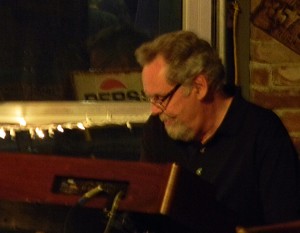 have Reese Wynans, the keyboardist who played with Stevie for the last five years of the great guitarist’s life, as a special guest speaker/performer. Reese was kind enough to share his story with me and a room full of alums at our monthly Nashville Berklee Jam last Tuesday at The Fillin’ Station.
have Reese Wynans, the keyboardist who played with Stevie for the last five years of the great guitarist’s life, as a special guest speaker/performer. Reese was kind enough to share his story with me and a room full of alums at our monthly Nashville Berklee Jam last Tuesday at The Fillin’ Station.
Almost 20 years before he began working with SRV he was playing in cover bands in his home state of Florida, and he recounted one of his first bands playing five sets a night, six nights a week. Two of the other members were Dickey Betts and Berry Oakley and on their one day off they would play a weekly free jam, adding Duane Allman and Butch Trucks to the mix. Eventually Duane decided to start his own band and stole these key members to form The Allman Brothers.
After spending a few years in San Francisco and working with a still-unknown artist at this time, Boz Scaggs, he returned to Florida for a brief period and then worked the East Coast in a show band for a few years. Reese then migrated to Austin, Texas, a booming town full of blues-infused music by this point of the mid-70s. Of this time, Reese spoke passionately.
“It was really great for me living in Austin…everything was so rootsy…they had a great music scene back there in the 70’s. They had a great blues scene, and a great blues club called ‘Antone’s’…and I would go and sit in at Antone’s anytime I had a chance. I was ending up really lovin’ the blues during this time.”
By 1980 he found himself working for Delbert McClinton, playing on four of his records and touring extensively for the next five years. By 1985, Reese was ready to get off the road, and would have if not for a fateful encounter at the end of his final gig with Delbert. Apparently, Delbert’s sax player had been invited to play on one song of a Stevie Ray Vaughan recording session after Delbert’s concert, and at the last minute Reese was asked to join in as the other keyboardist did not show up. Things went very well at this particular recording session, one which produced the hit, “Look at Little Sister” and Reese was asked to come back and record the following day. By the end of that recording session he was asked if he wanted to join the band. Reese summed up a life lesson from this critical moment,
“When a door opens for you, you’ve got to be willing to walk through it, and then be able to deliver once you get through there.”
The next five years would yield three Grammys, several world tours, and a reintroduction of the blues to the masses –
“We were spokesman for Texas blues…as much as Stevie didn’t want to, BB King had to open for us, because we were just more popular than him. He said “no we can never, BB’s always closing the show”… but finally, we had to headline…I loved playing in that band…we were all totally immersed in the blues, and we felt like were the vanguard of the blues. We were dragging Buddy Guy and Otis Rush into the light and presenting them out on our shows to people who were just hungry for that music…the stuff that we played I thought was shining a light on all the huge blues guitar players that had come before us, and that was a wonderful thing to do, I felt like it was really worthwhile.”
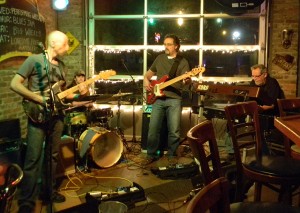 After Stevie’s tragic passing, Reese wound up in Nashville, TN, a place where he has continued to record and perform on a national level. During the talk, Reese passed around his All Music Discography, which reveals a staggering body of work, including Brooks and Dunn’s 2006 single of the year “Believe”. He offered us some thoughts about the differences between studio and live performance –
After Stevie’s tragic passing, Reese wound up in Nashville, TN, a place where he has continued to record and perform on a national level. During the talk, Reese passed around his All Music Discography, which reveals a staggering body of work, including Brooks and Dunn’s 2006 single of the year “Believe”. He offered us some thoughts about the differences between studio and live performance –
“I like being in the studio, I like playing gigs, I like playing clubs…all you people who do studio work know it’s two different things. Playing a club is really a chance to experiment…a chance to reach out in different directions and really find yourself. The studio isn’t really a place for that. The studio is where you don’t have to play it safe, but you’ve got to do something that’s exactly right for the 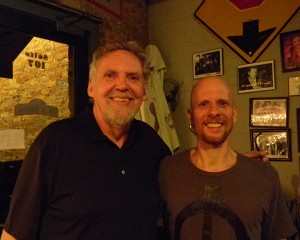 song…it’s a place for finding something that works, finding something unique that works.”
song…it’s a place for finding something that works, finding something unique that works.”
After his talk was finished, Reese was gracious enough to perform a set with our house band – a performance that was nothing short of inspired. I’ve heard his playing on many records, but there’s something intangible that you can feel in the heat of live performance that goes beyond a recording, and that was evident on this night. One of the songs we played together was “Little Wing”, a song that he had played on tour with Stevie, back in the day. On this song, Reese seemed to really stretch out in one of those magical musical moments in which time seems to stand still (see video below).
Eventually, this special night had to end, and we said goodbye after a quick photo op. Thanks, Reese, for sharing your wisdom, and for continuing to shine some light on that crown jewel of American music we call the blues.


